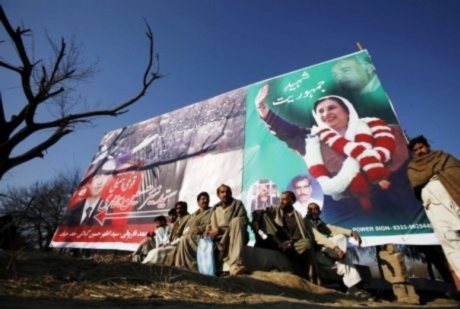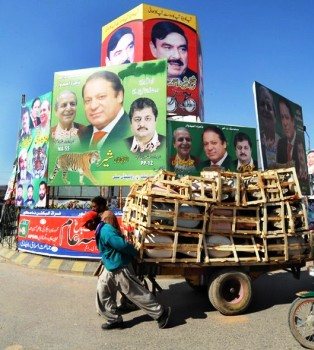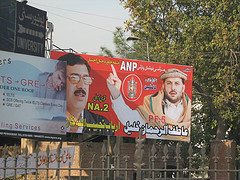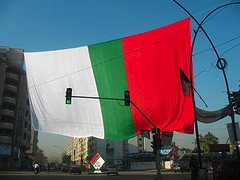Progressive Pakistan
The nation is gearing up for Election 2008 but issues-based politics remains a distant dream. However as an electioneering ritual all major political parties have announced their election manifestos to offer voters their pledges, promises, potential policies and programmes that will be realised if they are voted to power on February 18, 2008.

The comparative analyses of the manifestos of various political parties reveal that special emphasis has been laid on education. At least in the manifestos of Pakistan Muslim League-Q and Pakistan Muslim League-N education figures as priority number one.
Written in grand narrative most of these manifestos are economical in terms of practical strategies to realise a party’s vision. Vague statements and slogans like “universal primary education†are being raised once again. It is surprising that the government and establishment is claiming that they have done a lot in the field of education but the gross domestic product (GDP) allocated for education is below three per cent and international ratings are not showing and magnificent height in the percentages of literacy.
 The slogan “Parha Likha Punjab†(educated Punjab) acclaimed during the election campaign, dies its death when the male literacy rate of Punjab remains lesser to that of Sindh and a slight difference of one per cent appears on the board when comparing the overall literacy rate of both the provinces (Sindh 55 per cent and Punjab 56 per cent).
The slogan “Parha Likha Punjab†(educated Punjab) acclaimed during the election campaign, dies its death when the male literacy rate of Punjab remains lesser to that of Sindh and a slight difference of one per cent appears on the board when comparing the overall literacy rate of both the provinces (Sindh 55 per cent and Punjab 56 per cent).
It is a pity to see the dreams of quality education through the eyes of political manifestos which is actually a least strategically touched phenomenon.
The Centre for Civic Education conducted an issues-based comparative analysis of the manifestos of six major parties viz.
PPP, PML-Q, PML-N, MQM, MMA and ANP in Election 2008. If one judges these parties on what they stand for to improve education both in the quantitative and qualitative terms, the observed fact is that they lack any clear understanding of the real problem. Their educational plans at best are slogans open to multiple interpretations rather then specific and strategic policy initiatives to be implemented during a five-year term.
There are many ways to judge the quality of any plan and measure its practicality. While sailing through the manifestos to draw a comparison SMART’s (Specific, Measurable, Achievable, Realistic and Time-bound) approach was the parameter to judge the stance of political parties on education.
 PML-N, PPP and MQM stand firmly on drawing specific and measurable objectives to be met after success in the elections. On the contrary, PML-Q, ANP and MMA has touched the issues more as slogans rather than a strategy. The major missing link in the manifestos is description of timeline except PML-N and PPP who designed a time bound educational sketch for enriching growth.
PML-N, PPP and MQM stand firmly on drawing specific and measurable objectives to be met after success in the elections. On the contrary, PML-Q, ANP and MMA has touched the issues more as slogans rather than a strategy. The major missing link in the manifestos is description of timeline except PML-N and PPP who designed a time bound educational sketch for enriching growth.
Apparently political manifestos of the PML-N and PPP can be described as the better ones as good paper work has been done. They have designed a somewhat practical approach for enhancing the quality and quantity of education if it is practiced in the long run.
All the political parties have shown their concern to improve the quality of education but they haven’t shown any realistic way to achieve this goal. Secondly, the overall vision about education cherished by political parties lacks democratic context. The parties also appear to be miser in talking about civic education and long awaited textbooks reforms.
Apart from the SMART approach, in depth revision reveals that there are some major distinctive features presented in the manifestos that can be acclaimed a step towards a change in existing educational system.
 Training of our teachers can bridge the gap created by lofty worldwide progression in the field of education. PML-N talks about centres for professional excellence by qualified teachers for quality education while PPP take a lead by announcing development of quality assurance boards for the check and monitoring of performance of educational institutes and MQM has shared the same stance. PML-Q talks about teachers training in the form of general statement without any concrete plan. ANP and MMA has over-looked the issue without any specific plan.
Training of our teachers can bridge the gap created by lofty worldwide progression in the field of education. PML-N talks about centres for professional excellence by qualified teachers for quality education while PPP take a lead by announcing development of quality assurance boards for the check and monitoring of performance of educational institutes and MQM has shared the same stance. PML-Q talks about teachers training in the form of general statement without any concrete plan. ANP and MMA has over-looked the issue without any specific plan.
The last few decades have inculcated apathy and absolute estrangement of youth from democracy in general and politics of Pakistan in particular for the reason of banned student unions. MQM and PPP have raised voices for the removal of ban on student unions while other political parties are silent on the issue. PPP has a standpoint to permit student unions to grow in educational institutes but with a ban on the use of arms. MQM stands at increasing of extra-curricular activities through elected student unions.
PPP has given practical and strategic plan for madressah reforms by curriculum revision to remove elements of hate and violence that evoke student militancy. MQM also talks about syllabus revision but their stance is to bring it in conformity with mainstream education. PML-Q talks about madressah reforms by modernisation of the curriculum in madressahs. Other parties have kept silent on the issue.
Prevailed dual standards of education has widened the gulf between government and private schools and have divided the generation further on the basis if educational disparity.
 MQM has announced premeditated plans for revision of syllabi to abolish dual education standards of Urdu and English medium schools by improving the standard of Urdu medium schools. PML-N and ANP have shared the plan of revision of syllabi at all levels to eliminate multi-class education system and introduction of a high-standard uniform education. Other parties have shown no concern about the issue.
MQM has announced premeditated plans for revision of syllabi to abolish dual education standards of Urdu and English medium schools by improving the standard of Urdu medium schools. PML-N and ANP have shared the plan of revision of syllabi at all levels to eliminate multi-class education system and introduction of a high-standard uniform education. Other parties have shown no concern about the issue.
The meticulous scrutiny suggests that the agenda of political parties should be to bring revolutionary change in the existing educational system which is possible only if a highly synchronised approach is implemented to meet the global demands. There is no time left for raising enchants and fascinate the public with catchwords. It is time for ground-breaking democratic strategies, reforms in syllabi and improvement of the existing educational system to streamline discrepancies on the basis of gender, socio-economic classes educational disparity and geographical plane
Note: The article above was also published in Dawn at Education page on 10th Feb, 2008
Photos: From the Associated Press and Flickr.com



















































the information provided here about the policies and agendas of major political parties on various issues is very important But after reviewing manifestoes of these parties on their official web I feel that some of the very important facts behink the articulation and the politics of manifesto must be discussed like;
manifestoes are found to be more promising and filled with supercilious ideas rather than providing clear policy statements and its frameworks. This tone of the manifestoes enforces the reader to re-search the definition of manifesto in the dictionaries
I would like to have my say that its a good strategy to make pledges and promises with the general public about future plan of action. The promises should be realistic and achieveable rather making general statements that are neither timebound nor measurable as PML-Q has did.
PPP and PML-N has presented strategic plan for enhancing education although its lackluster while compared with education strategies of neighbouring countries but still it is measureable.
As far as the political situation after elections is concerned its in a great sway. A hung parliament would not be able to meet the challenges ahead like;
* Law and order situation
* Out of reach Inflation
* Judicial crisis
* Restoration of Constitution
* Poor economic condition
* Very high hopes of general public
and above all the deal with Musharraf who is firm at his position and it would be a hard nut to make him say Goodbye as he has the hunger of rule.
So lets hope for the better
Elections -2008 are over and pleasantly too. Allah ka shukar hai.Pakistani Citizens,as usual,made it so peaceful and fulfilling but this time around the Government too and its staff also needs a pat on the back. CONGRATULATIONS ,TO ALL PAKISTANIS !!
Lets have bright sunshine,peace,harmony and above all some national Progress above the African 9% GDP growth (we are behind,despite GOP,s claims).
May Allah bring cooperation and harmony between the urban-rural divide and a Happy coalition government between PPP-MQM result in a prosperous SINDH. Ameen
Khanzada Emran-Karachi
ek@super.net.pk
A BIG TASK FOR NEW GOVERNMENT
The critical issue which is day by increasing,the bad situation of trible areas what is happing in Balochtisan,trible areas of NWFP these are the things which is highly effected our reputation in the whole world & it mostly effect the people living in & outside pakistan.
It is request to all parties any one may be winner, please focus on education beacuse our latracy rate is very low.
And we pakistani count this rate by checking how many students are going institiution, but there is no check and balance that how many achive there goal. One biggest issue is that our government never check that how many schools are running in villages according to them we made schools and posted teachers and we did our job.which is not a board thinking.And focos on eduction. thanks